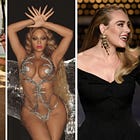A perhaps unsurprising tidbit: Khloé Kardashian reigns supreme as the celebrity who posts the most AI-generated content on Instagram1. Per Freepik, an AI image generation tech company, more than 25% of Khloé’s posts (mostly of herself) have allegedly been altered by AI in some way.
More than enough has been said of the Kardashian/Jenner family’s dreadful influence on beauty standards and body image. I personally don’t feel influenced or stricken with comparison despair when I see a Kardashian because I’ve beaten myself over the head for years with a bat engraved with the phrase Celebrities’ Bodies and Looks Have Nothing to Do With You. But there are many people who do feel those ways, especially young women, so anxiety on their behalf about the Kardashian influence is justified.
When I see Khloé and learn this stat about her Instagram, I soften a bit despite myself. I don’t feel sympathy for her and her piles of money earned from exploiting and profiting off of the insecurities of a generation of women, no2. I don’t absolve her of the damaging effects her image manipulation antics might have on others. I feel some degree of empathy, though, and curiosity: Why does Khloé alter her Instagram images more than any of her famously self-obsessed and Photoshop-happy family members? Why did she allegedly freak out when this perfectly fine but not edited picture leaked?
In my estimation it’s not because she’s uniquely evil or vain or unhinged. It’s because for most of her life she was considered the “ugly” and “fat” one in a family of beautiful, smaller sisters and so she’s likely going to be at least a little bit broken about her looks for the rest of her life. That’s something I understand.
I don’t have sisters, but I was a fat girl in the particularly unforgiving early aughts who had a beautiful, slender, and youthful mother and a host of beautiful and slender cousins and girlfriends. I was disrespected and abused in various ways for being “the fat one” throughout the most sensitive and formative years of my life. I experienced that as a regular person. The idea of experiencing it as a famous one chills me to the bone.
Most people, especially women, are privy to the cultural and societal forces that slash their self-image to ribbons over the course of their lives. You might sneer, “Boo-hoo, Khloé, like you’re the only woman in America with hang-ups about her looks,” and you wouldn’t be wrong to do so. I can tell you, though, that there is a lower circle of this hell to which you descend when you’re even a little bit bigger than everyone else.
This isn’t the Body Oppression Olympics (and if it were, my formerly just-barely-plus-sized, white, cis, able-bodied self would lose), but it’s unquestionable to me that Khloé endured more vociferous mistreatment about her looks than her sisters and so might continue to experience more profound body dysmorphia as a result. I can’t wish that on anyone.
When it seems clear that Khloé can’t post a selfie or move through the world without using editing tools or a litany of cosmetic interventions to craft herself into the shape of a person who she falsely believes could finally satisfy her detractors and herself, I am only sad for her. She embodies, in the extreme, the painful truth I recognize in myself and countless others: The work of merely trying to be OK with yourself feels interminable, and that we have to try this hard at all is a tragedy.
Maybe you’ll feel I’m being overly compassionate about a woman who has negatively influenced millions of fragile and impressionable people while she merrily lives off the profits. I’ll risk that to make the crucial point: A better body culture will not spring from perpetual fury toward people who are suffering under the same standards as the rest of us even if they have their riches to keep them warm at night.
It will spring from recognizing the myriad ways people, no matter who they are and how they live, struggle against beauty and body standards that took shape long before the Kardashians began cavorting around Calabasas. This does not mean they are beyond criticism for perpetuating and profiting off those standards. There is room for both.
Khloé is only the latest person for whom I have compassion where body bullshit is concerned. I’m able to feel more compassionate toward her because the writing and thinking I do about bodies has helped me have more compassion for real people in my real life. Before that, I had to learn to have it for myself.
I genuinely hope she can one day do the same.
Shakira is not far behind at 15+%, as is Chris Hemsworth (Wow, OK?) at 14+%.
I’m gonna say something, though: Her Good American jeans are good. They go up to a size 32. You can view models of various body types wearing the jeans. I like this. What is not good: Her new high-protein popcorn. I’m a gym rat but still, not everything needs protein!








Great post Mikala! My dad has said to me “fame is cruel and unnatural” and that sentiment always comes to mind when celebrities’ body stuff becomes public conversation. No one would be “normal” or “okay” under that level of scrutiny! Money is nice, but you can’t buy self esteem.
This is a great analysis of the both can be true way of understanding.
Celeste Davis recently wrote about this in her Defense of Horrible Botox a la the Nicole Kidman discourse: https://open.substack.com/pub/celestemdavis/p/in-defense-of-horrible-botox?r=22kzjx&utm_medium=ios
We are all heartbroken and stuck inside a system where we are damned if we do, damned if we don’t. Its exhausting! And yet, I think compassion and hope for a better world is necessary to keep going. <3